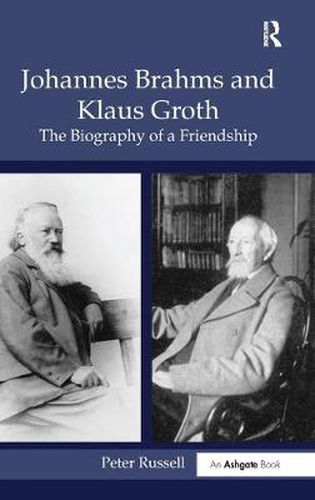Readings Newsletter
Become a Readings Member to make your shopping experience even easier.
Sign in or sign up for free!
You’re not far away from qualifying for FREE standard shipping within Australia
You’ve qualified for FREE standard shipping within Australia
The cart is loading…






Over the past twenty years musicologists and theorists have been intensely preoccupied with Brahms’s compositions. The same, however, could not be said for biographical issues. The relationship between the composer Johannes Brahms and the poet Klaus Groth, both important creative forces with strong roots in the Dithmarschen region of northern Germany, was a very special one that deserves greater recognition. In his lifetime Klaus Groth was a celebrated German poet because of his works in Plattdeutsch, a dialect with which Brahms was familiar. Unlike any of Brahms’s other friends, Groth and his family had ties to the family of Brahms’s father that extended back a number of generations. That he came from the same region as Brahms seems to have endeared the poet to the composer. Aside from Daumer, Brahms chose to set Groth’s poems more frequently than those of any other writer. Both Groth and his wife Doris were greatly indebted for these settings, and they showered Brahms with praise. Peter Russell has made careful selections from the 89 letters that have been preserved, placing them in the context of the personalities, lives and works of both men. Alongside the letters, Russell provides a substantial commentary that includes analyses of Brahms’s music and critical assessment of Groth’s poems.
The book includes two appendices: Brahms’s settings of Groth’s poems and a list of Groth’s publications in Brahms’s library.
$9.00 standard shipping within Australia
FREE standard shipping within Australia for orders over $100.00
Express & International shipping calculated at checkout
Over the past twenty years musicologists and theorists have been intensely preoccupied with Brahms’s compositions. The same, however, could not be said for biographical issues. The relationship between the composer Johannes Brahms and the poet Klaus Groth, both important creative forces with strong roots in the Dithmarschen region of northern Germany, was a very special one that deserves greater recognition. In his lifetime Klaus Groth was a celebrated German poet because of his works in Plattdeutsch, a dialect with which Brahms was familiar. Unlike any of Brahms’s other friends, Groth and his family had ties to the family of Brahms’s father that extended back a number of generations. That he came from the same region as Brahms seems to have endeared the poet to the composer. Aside from Daumer, Brahms chose to set Groth’s poems more frequently than those of any other writer. Both Groth and his wife Doris were greatly indebted for these settings, and they showered Brahms with praise. Peter Russell has made careful selections from the 89 letters that have been preserved, placing them in the context of the personalities, lives and works of both men. Alongside the letters, Russell provides a substantial commentary that includes analyses of Brahms’s music and critical assessment of Groth’s poems.
The book includes two appendices: Brahms’s settings of Groth’s poems and a list of Groth’s publications in Brahms’s library.